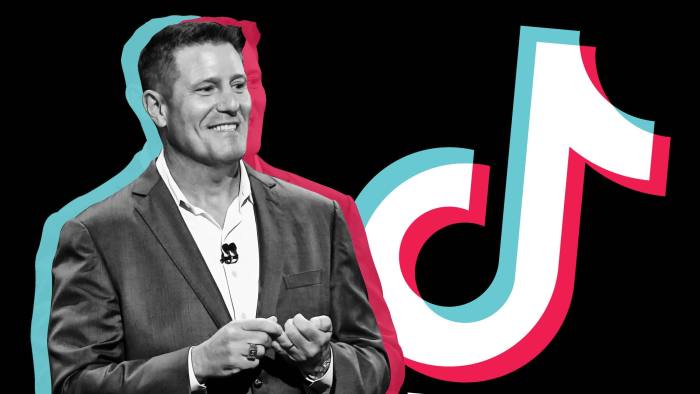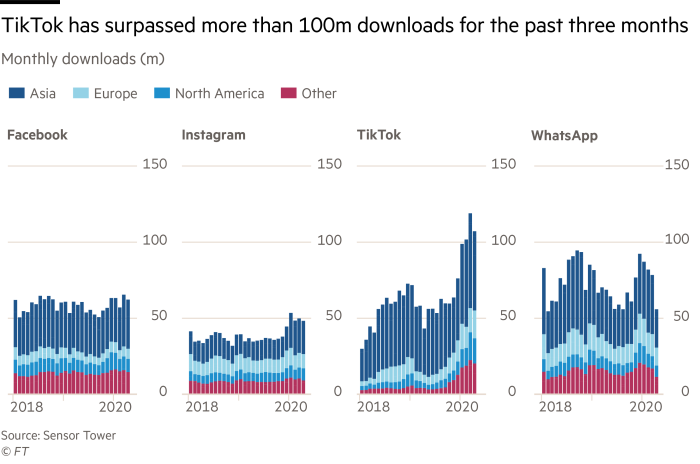
Can former Disney executive Kevin Mayer transform TikTok?
American prepares to steer Chinese sensation through US turbulence
by Henny Sender, Hannah Murphy, Anna Nicolaou, Yuan YangHomer Simpson, Darth Vader and Captain America have a shared back-story: they were all brought to Disney by Kevin Mayer.
Now the square-jawed, all-American media executive is preparing for his own epic adventure, with a company that some see as on the wrong side of the tracks.
In June the 57-year-old will take charge of the Chinese app TikTok, whose presence on the smartphone screens of 1bn people around the world has brought it to the keen attention of policymakers from Washington to Delhi.
As a dealmaker at Disney, and then as the head of its streaming service, which has racked up more than 50m subscribers in under six months, Mr Mayer is known as a problem solver who works gruelling hours.
But after he was passed over for the top job earlier this year, in a decision that opened up questions about Disney’s commitment to streaming, the invitation to join the board of ByteDance, the $75bn Beijing-based juggernaut that owns TikTok, became irresistible.
One of Disney’s senior executives, who discussed the move with Mr Mayer, said they had agreed there were “great opportunities” in applying ByteDance’s technology, particularly the algorithm that predicts what viewers will enjoy, more widely.
“At an operational level, ByteDance has the most advanced AI, it’s way more evolved than companies like Amazon, and Kevin sees great opportunities in that,” the Disney executive said.
One example is Resso, the music-streaming platform that ByteDance has launched in India and which allows users to match songs with video clips and animated images. If Resso signs up big music labels, “its power in artificial intelligence and video recommendations could make it a real competitor [to Spotify]”, said one senior executive at a music label.

But Mr Mayer has little experience of navigating the treacherous waters swirling between the US and China, nor of dealing with the often prurient content that has made TikTok both popular and controversial.
“He is in a sensitive political zone,” said the Disney executive. “He has to build transparency in the US business, and make it acceptable to the political establishment in the US. He also has to align TikTok with its Chinese masters. And he has no experience of either.”
The company is awaiting the outcome of a US national security probe. Politicians have criticised it over the unproven potential to share foreign user data with the Chinese government, as well as for its content moderation.
“We have a bit of a communications problem, I think, with political leaders,” said Bill Ford, a ByteDance board member and investor through his private equity group General Atlantic. “Everything from [us] being part of the Communist party to sharing data from TikTok with the Chinese government — which is all factually incorrect.”
Mr Mayer is “looking forward to meeting with government leaders to increase their understanding of TikTok's business”, Mr Ford added.
As it tries to appease markets outside of China, ByteDance is weighing how far it should go in splitting TikTok away from its Beijing parent.
Mr Ford said that building a “TikTok board” was “something we're working on”, though he later added in a statement that there were no plans to introduce a separate “board of directors”. Both he and a TikTok spokesperson said the company was instead exploring creating more outside advisory positions.
The most important part is to create a structure that gives the confidence to know that TikTok is run according to American standards . . . and global standardsPhilippe Laffont, Coatue Management
“The most important part is to create a structure that gives the confidence to know that TikTok is run according to American standards . . . and global standards,” said Philippe Laffont, a ByteDance board member and head of the tech hedge fund Coatue Management.
“They will do product development in the US and TikTok will ultimately list in New York,” predicted the Disney executive. But one ByteDance investor denied this, saying: “There are other ways to solve any issues and address any concerns about things like data privacy. We will have to be local everywhere. We will try to be rational.”
No background could be more blue-chip, in the eyes of Washington, than Mr Mayer’s Disney pedigree, especially as TikTok faces headaches over how it protects the children using its app. Last year, it was fined $5.7m by the FTC for misusing kids’ data.
But he “can still become a target”, said one Chinese media executive based in Los Angeles, who was pessimistic about the deteriorating relationship between Beijing and Washington.
For ByteDance, Mr Mayer represents the bridgehead for its global expansion plans.
In March, its founder Zhang Yiming announced that he aimed to have 100,000 employees by the end of 2020, an increase of 40,000, the equivalent of hiring almost the entire staff of Facebook in nine months. In April, the company posted 10,000 new jobs, with the biggest locations outside of China in the US, London and Singapore.
In the US, ByteDance has hired executives including Erich Andersen, a former Microsoft vice-president, as its global general counsel, Ole Obermann, a former Warner Music vice-president, Blake Chandlee, the former Facebook advertising chief and Vanessa Pappas, the former head of creative insights at YouTube.
But several US executives have turned down offers and some of the company’s new hires felt “handcuffed” by the ultimate decision-making power resting in Beijing, according to two media industry figures who know them.
As well as hiring, Mr Mayer is charged with making ByteDance’s international businesses profitable and expanding its stable of music, games and video beyond China. If he succeeds, he will have created the first truly global Chinese software brand.
ByteDance’s overseas business only brought in around 1 per cent of its Rmb130-140bn ($18-20bn) revenues last year, according to the Chinese media site LatePost, which reports that this year it is aiming to increase revenues to Rmb180bn, and increase overseas revenues 5 times to Rmb7.5bn. ByteDance declined to comment on the figures.
TikTok’s sister app in China, Douyin, is the main driver of the company’s sales, and ByteDance now has nearly a fifth of the local online advertising market, according to investor Tiger Global, suggesting annual sales of $15bn.
But while he has been named as ByteDance’s chief operating officer, Mr Mayer’s remit is the overseas business. He will not have oversight of the company’s China operations.
“The COO title seems misleading to me. He’s really COO of everything outside of China. The important revenue-generating parts of the business are not under his control,” noted Matthew Brennan, founder of ChinaChannel, a research firm.
Mr Mayer’s background indicates that TikTok may invest more in content. It is already exploring whether to commission professional publishers and reality shows, and ways of monetising its roster of creators.
His hire is “a clear sign they [ByteDance] want to be a buttoned-up media company”, said one music industry executive involved in negotiations with TikTok. “The disrupters’ playbook got them to this point. But the hiring of Kevin Mayer suggests that their ambitions to scale up and IPO . . . that will take priority.”
Additional reporting by Nian Liu and Ryan McMorrow in Beijing